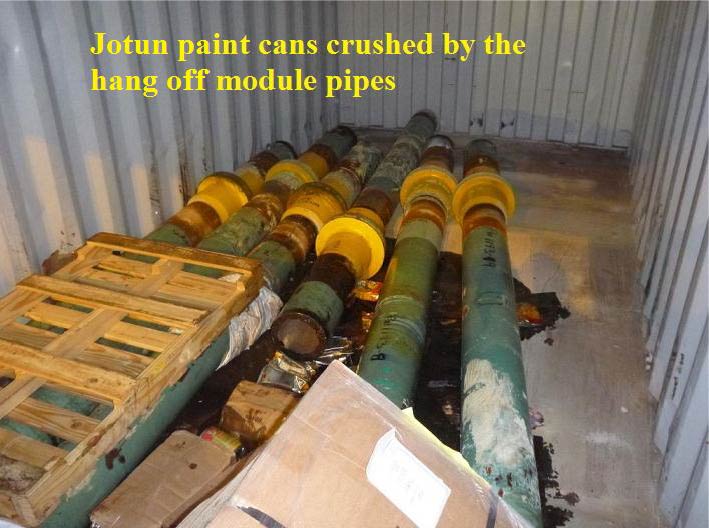Poor cargo stowage: material damage on container
A member has reported an incident in which a freight container was delivered offshore with damaged internal contents, owing to poor stowage. When the doors of the container were opened, there was a strong smell of paint. It was discovered that heavy pipes had been loaded into the container but had not been stowed properly or lashed down. The pipes had moved during transit and had crushed part of the other cargo, including a number of cans of paint and some welding consumables.

Our member notes that this is a good example of the need for proper stowage and lashing. Cargo in a freight container that is not lashed down properly can easily shift during transit and damage itself or other cargo. In this example it is cans of paint, but it could easily cause a much more serious hazard of dropped or falling objects when the doors are opened, as well as a potential spill to the environment.
Safety Event
Published: 21 January 2014
Download: IMCA SF 01/14
IMCA Safety Flashes
Submit a Report
IMCA Safety Flashes summarise key safety matters and incidents, allowing lessons to be more easily learnt for the benefit of all. The effectiveness of the IMCA Safety Flash system depends on Members sharing information and so avoiding repeat incidents. Please consider adding [email protected] to your internal distribution list for safety alerts or manually submitting information on incidents you consider may be relevant. All information is anonymised or sanitised, as appropriate.
IMCA’s store terms and conditions (https://www.imca-int.com/legal-notices/terms/) apply to all downloads from IMCA’s website, including this document.
IMCA makes every effort to ensure the accuracy and reliability of the data contained in the documents it publishes, but IMCA shall not be liable for any guidance and/or recommendation and/or statement herein contained. The information contained in this document does not fulfil or replace any individual’s or Member's legal, regulatory or other duties or obligations in respect of their operations. Individuals and Members remain solely responsible for the safe, lawful and proper conduct of their operations.
